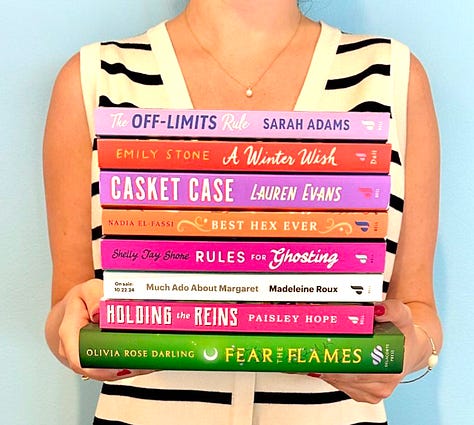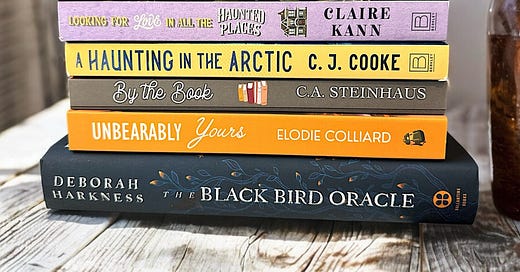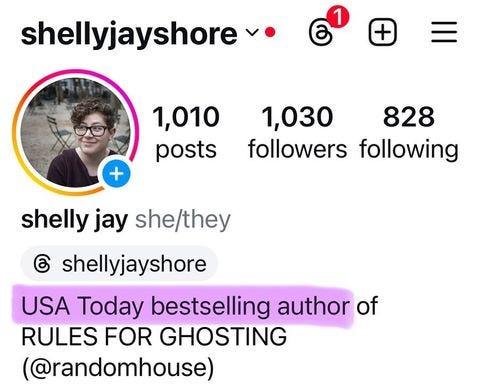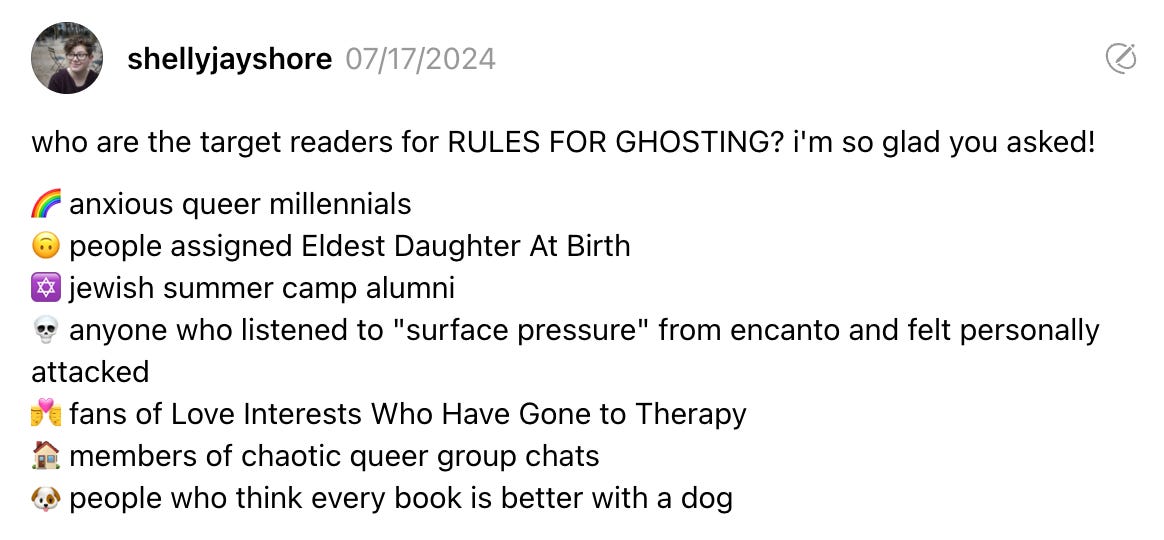So, I’ll be honest: When everyone warned me that there would be a creative slump after I published my first book, I kind of brushed it off.
“Haha,” I said to myself. “Surely not! I love writing! I love creativity! I’m so good at it! Look at this whole book I just wrote and published! I definitely will not get into a sophomore slump! Or a post-launch crash! Or any of those things that happen to other people!”
Well, anyway:
So, here we are. Post-launch slump.
In past newsletters, I’ve written about creative accountability, and about rainy days in the creative cycle. I’m not, as it happens, unfamiliar with the ebbs and flows that come with creative work, or with the ego crash that can often come with them — that sense of, “oh dear lord, this is The Thing I’m supposed to be good at, and now it’s not working, Please Send Help” that comes with every empty document that refuses to generously populate itself with words. There’s the fear that the well has run dry, that we’ve used up our last “good” (read: marketable, sellable, capitalism-friendly) idea, that the skills that used to work just plain don’t anymore.
It sucks! Let’s get that out of the way. It sucks, right? We should definitely be able to say that it sucks. It can feel like a “Kim, there’s people that are dying” sort of problem, and it’s hard to complain about it, except maybe to other creatives, because, well, there’s people that are dying, right? And here I am, stressed over my little words not word-ing the way I want them to. Even though the little words are literally my career, it adds a layer of guilt on top of the stress.
But let’s talk about the guilt. Specifically, the guilt of indulging in whatever kinds of projects do get the words (or paints, or recipes, or musical notes, or whatever mode of creativity happens to be) flowing again.
For me, it’s writing a lot of fanfiction. For you, it might be coloring books, or a tried-and-true family recipe, or playing an old favorite song until your fingers tingle. Just about every creative has that sort of guilty-pleasure form of creativity — that kind of creation that doesn’t take effort or doesn’t have marketability or can’t be monetized, and therefore, we tell ourselves, it’s worth less. It’s not a good use of our time, or talent, or creative energy.
The more we absorb that kind of messaging, even if it’s only coming from our own inner capitalist (and wow do we hate that guy!), the more that guilty pleasure creativity starts just becoming guilty creativity. It loses its comfort. It loses what makes it so important to our creative restoration — which is the fact that it’s easy, it’s fun, and it brings us joy.
What happens if instead of guilty pleasure creativity, we just called it what it is: pleasurable creativity? Fun creativity? Creativity for creativity’s sake — making something, in whatever form, for no other reason than that it keeps the energy flowing, and stretches our creative muscles, and feels good to make?
This applies to activist work as much as it applies to creativity. There’s a belief that only certain kinds of activism make a difference, even though what kind of activism that is will change depending on who you talk to. But the message too many of us internalize is that if we’re not doing the “right” kind of activism — or, worse, if we’re not suffering for our activism — that we’re not doing enough. That if we’re not in the streets, or on the phone with our legislators, or coordinating mutual aid, or sharing every GoFundMe campaign on your social media feeds, or donating to every GoFundMe campaign on your social media feeds, or somehow doing all of those things at once, that whatever you are doing doesn’t matter, or doesn’t count.
Let this be your permission: Do what you can. Do what feels good. Making a difference doesn’t have to hurt. It doesn’t have to feel like work.
I’m a huge fan of the philosophy and perspective shared through the Social Change Ecosystem Map, a framework for movement-building that identifies different roles we can play in the work of transforming our world for the better. The pressure to do the “right kind” of activism comes from a perspective that we should somehow hold all of these roles at once, or that only some of those roles matter. But every person has something to bring to this work, even if that something changes, ebbs, or flows from one day or week or month or year to the next. Just like we need to let go of the idea that doing “worthy” creative work requires blood and sweat and tears, we need to let go of the (capitalistic, honestly!) idea that doing “worthy” change work requires the same.
Make what feels good. Do what feels good. One day at a time.
questions on creating for good
What are your “guilty pleasure” forms of creation?
What makes you feel guilty about them? Where does that guilt come from? Who has told you that those creations are less worthy, less important, shameful, or somehow lesser-than?
What is the “pleasure” part of your guilty pleasure creativity?
What makes it fun? Why do you enjoy it? What does it feel like to engage in that kind of creativity? Who do you share it with — and if you don’t share it with anyone, why not? How does this type of creativity help you with what you consider your “worthy” creative work?
What is your “guilty pleasure” activism?
What do you consider the “least worthy” form of work you do to make a difference in the world, and why do you assign it that value? Where does that feeling come from? What would it feel like to see that form of work as equal to any other? What would change?
updates from shelly
Rules for Ghosting hit shelves exactly one month ago, and holy cow, y’all, she’s a real book!



The biggest piece of news to share: Rules for Ghosting is a USA Today Bestseller, baby!!! We hit the list in early September (and yes, I have been continuously checking back on the regular to see if we’ve wiggled our way back on) which means I got to make this extremely cool update to my profiles:
Author bucket list item: HECKIN’ CHECKED, Y’ALL.
Very shamelessly, for at least a few more newsletters, I’m going to keep plugging the many ways you can help me keep helping Rules for Ghosting find its people:
If you’ve read the book, the most helpful thing you can do is leave a review — on Goodreads, Amazon, social media (feel free to tag me!) or anywhere else! Reviews help show publishers that people are finding and enjoying the book, and it makes them more likely to buy my next projects!
Tell your friends about Rules for Ghosting if you think they’d like it! We all know the target audiences at this point, but word of mouth makes a huge difference in helping books find their readers. Be loud! Be proud! Be gay! Throw my book at people!
Check your local library for Rules for Ghosting, and if they don’t have it on (physical or digital!) shelves, ask them to order it in. Ideally in as many forms as possible!
Lastly, if it’s in your budget, please consider buying a copy of Rules for Ghosting! As much as I wish they didn’t, sales numbers make a difference — not just for this book, but in how much publishers will invest in my next projects, since they’re likely to be just as weird and queer and Jewish. (If not more so! What can I say, I love a niche.)
resources, links, and further reading
spotlight on: (guilty) pleasures, and doing the work
read: “writing so hard” by adrienne maree brown
read: “guilty pleasures are just pleasures” in Psychology Today
listen: “your passions aren’t guilty pleasures” on the Creative Juice Box podcast








this is such a good read, thank you thank you! i've been musing on the intersections between amateur (love) and professional (money) as well, and always land on the side of making stuff for the love of making stuff. sending you love in the post-launch slump -- you made such a tender, loving, passionate first book baby! i laughed, i cried, i loved all of them, but especially jonathan <33